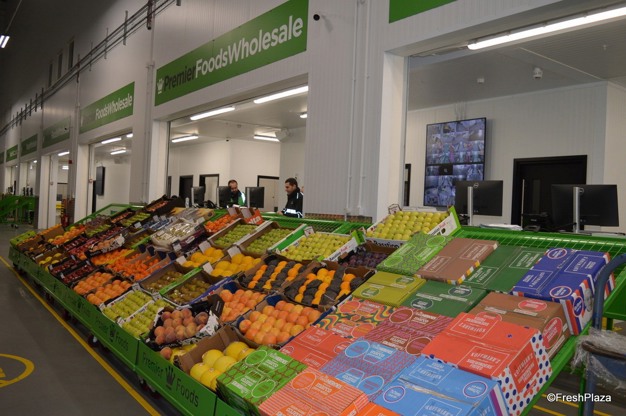New Covent Garden Market recently held an event to celebrate British Food Fortnight, where growers, traders, stakeholders and, of course the press were invited along for a tour of the on-going transformation of the market. There was also a chance to catch up with some the traders from the market to find out the pros and cons of the changing face of the market and the trade in general. This is part two of the report.
New Covent Garden Market has seen many changes over the years, one is how business is done. Traditionally fresh produce has been 'traded' in the sense that a price was agreed on the spot. Now people are moving more towards contract prices and more and more business is done on the phone or via email.
Nick Padley, Manager, Side Salads said that around 75% of products are agreed on a seasonal price. "It's not as much fun as it used to be and I don't necessarily like it, but you're securing business on a long-term basis. It can be a bit of a juggling act, of course. It worked well for me last year, not so much this year, but it's a different way of trading. I'd say it's the norm for salads now. Some of the smaller restaurants list 'seasonal' veg on their menus, so they can play around with the products."

Jason Tanner, MD of The Menu Partners and Premier Food Wholesale : "I would have had a bet five years ago that our guys could go out and beat any contract price over the course of the season, because of the natural ups and downs. Now we're contracting 95% of our product; let's say cauliflowers are £8-11 a box, well when they go short in the market they don't just go up to £12 a box, they can go as high as £24 a box. So when we're fixed in, you can't cover the £10-12 in losses in that period. On the customer side, a big proportion of our customer base now demands six-month pricing – I have two who want yearly pricing."
Will Thorogood, MD of Thorogoods and Rushton's: "The higher end restaurants have said for many years that they [want more] British produce. I'd say that now, they really do. The Michelin Star restaurants and those that can afford to change their menus daily, they have gone pretty much across the board with the farm-to-fork story with their customers. It's more developed with meat and fish, but it's definitely becoming a bigger thing with fresh produce. The higher end customers want that story.
"The good British growers are fantastic. Those that can provide that extra story will do really well and the more we can advertise to growers that we can access different markets for them, we're flexible and we pay quickly, the better. We don't do many fixed prices, we work more on a partnership basis, sometimes profit share arrangements. It's a different option for growers."
Quality is paramount
Gary Marshall, Owner Bevington Salads and Chairman of Covent Garden Tenants Association: "The biggest change, I think we'd all agree, is that yes we've always provided a service and been conscientious suppliers, but one thing that has come to the market that cannot be matched elsewhere is the overall quality of the produce. Quality has become paramount – we only have a four- or five-hour window each night to get our work done and generally speaking, if you look at the high-end shops like Bailey & Sage, Partridge's or even Harrods, they all buy from here. That's not as widely known as perhaps it should be. They only want the best."
Will: "The independent retailers have realised that they have to be different to the supermarkets. They can't compete on price with lower quality, cheaper product. If people are looking for that, they just go to the supermarkets. There is probably more of a market for high-end product In London and the South East than in other parts of the country. So, many retailers are transforming their businesses into high-quality offers and that's where they can compete."
Nick: "There is a wide range of retailers out there and they are offering customers a different points of interest, maybe larger spring onions, or organic fruit or packaging. Consumers are more conscientious, and they are buying into the experience."
More consumers coming into the market
Consumers have always been welcome in the market, but there are pros and cons. There is firstly the safety concerns, as it is a busy working market with vans and forklifts driving around which a consumer may not be aware of. The other thing is that they have to buy boxes, not in pounds or kilos. That said they are welcomed by the traders and many people club together to buy boxes of product as they are looking for unique, quality products.
Nick: "The consumers who are coming in are looking for a quality of product they can't get elsewhere. There are a lot of [South East Asian] people moving into the area surrounding the market who cook at home and wholesale markets are their background. We have products they can't get in Sainsbury's or Tesco and if you live in the new build accommodation around here, then money isn't a big issue."

British growers
At the event British growers were invited along to see the market and meet the traders. The traders welcomed the growers to market and said that over the years the supply from the growers and the demand has changed. Quality and presentation has improved immensely and the market's customers, the London chefs, are prioritising British produce.
Gary: "Quality, service and continuity is what New Covent Garden bases its business on and very quickly that was recognised around the world – more quickly than it was recognised here.
"Twenty-five years ago, we'd be getting salad products in second hand or broken boxes from British farms, but from the growers around Europe, we'd be getting better packaging, proper pallets and all that helps to make it a class I product. The British growers became polarised on only wanting to serve the big retail chains and let them call the shots. Once they'd done their order, they'd say 'oh, hang on there's a bit left here, send that to Thorogoods or Bevingtons'. Inevitably, that product didn't do very well, so the growers would tell their mates in the pub not to send their product to the wholesale markets as you don't get a good return. But what they were sending didn't deserve a return.
"What you're seeing now, the consistency of the English fruit that is on the market, the way they pack the cauliflowers and carrots now etc… if we could take the volumes the supermarkets take, they would drop them like a stone into the river. We can't of course, but I think the contracted prices that supermarkets tie growers down to is unsustainable. We saw it last year when the supermarket shelves were empty of certain products. There was no shortage here, or at Birmingham or Western. Only in the supermarkets because they had tied the grower down so tight – we're dealing with fresh produce, not cans of beans, so sometimes if the weather doesn't play ball, the prices you agreed six months ago just don't work for the grower. With all best intentions, people can forecast what they are going to grow, but if the weather changes, so does that forecast. We have to recognise that."
Nick: "We have customers who understand the nature of growing and if prices move up or down at certain times, it's reflecting what has happened in the supply chain. Generally, the supermarkets don't budge. We'll work with our growers – I lost a long-term cucumber supplier last year who had been ground down over the years by his supermarket customers. The growers who focus on their wholesale market business and reinvest, make sure the quality of the product and the way it's presented, packed and graded consistently, they're the ones who are successful today. There isn't an English grower that I don't pay within one week of invoicing, because we're trying to keep their cashflow going. It's a two-way street – the more we can support them, the more likely they are to stay loyal to us.
"Our customers do want British produce – the chefs who cook seasonally out there are prioritising it. We just need more availability."
Jason: "Of course the chefs want British, without a shadow of doubt. When, all of a sudden British tomatoes are £2-3 more expensive a box than Belgian though, the people who are running the contracts will go for the Belgian product.
"Unfortunately, what has happened to a lot of our customers in the High Street is that they can't argue about the rents, the rates or the electricity bills, thy only products they can argue about on price are fresh produce, meat and fish. We found the strength was on our side after the pandemic for a while, but in the last 18 months it's settled down and all the groups are looking for every single penny again. They are having to be so hard with their suppliers and as the prices we pay have gone up 15-20% in the last five years, our turnovers have gone up with them, but our margins are much tighter.
Nick: "As much as a customer might want to buy British, they are unlikely to give you £3 a box more for it than imported product of the same quality. It's important, but they need to get their margins out of it as well."
Gary: There is compassion and empathy for our growers in the wholesale markets that in my opinion doesn't exist in other sectors.
